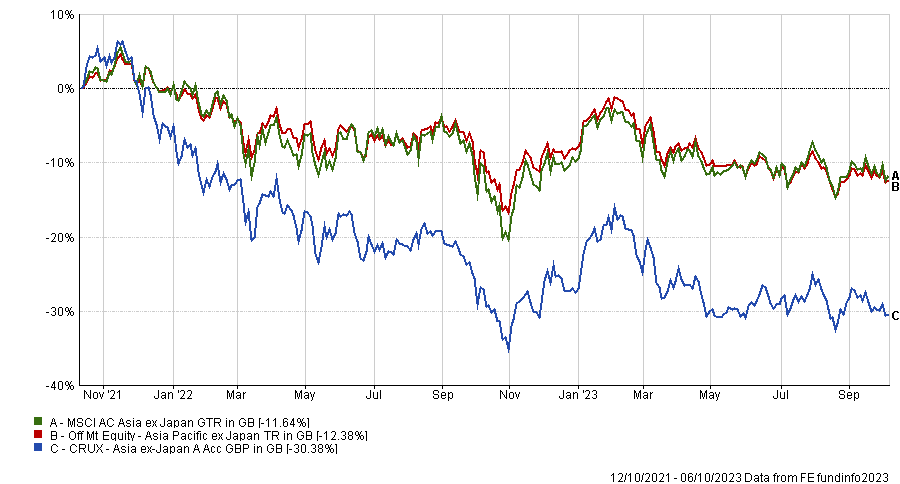The artificial intelligence (AI) rally this year has mostly been a US story, led by the magnificent seven that are Apple, Alphabet, Meta, Amazon, Microsoft, Nvidia and Tesla.
Yet, Ewan Markson-Brown, manager of the CRUX Asia ex-Japan fund, said that Asia also has companies that are well positioned to benefit from the rise of AI but are being ignored by investors.
The former Baillie Gifford fund manager is bullish on the prospects of AI-related companies in Asia, with his entire exposure to Taiwan and South Korea allocated to AI-related companies, with holdings such as Unimicron, a Taiwanese printed circuit board manufacturer.
Yet, the bigger player in the region is China, which Markson-Brown sees as a credible competitor to the US in the AI space.
He said: “People have been focusing on the US and the NASDAQ, but no one cares about Asia. If you look at the past decade, there were only two places in the world innovating: the West coast of the US and the East coast of China. With today’s AI story, we have the feeling it's just about the West Coast of the US.
“China has arguably the world's largest pool of talent in technology outside the US and is a credible competitor to US tech. Within the next three years, people will refocus and realise that this is the largest consumer market in the world outside of the US. People want to innovate, they want to consume and all of the tech is domestically produced.”
For Markson-Brown, the question is whether that talent will be allowed to work and operate, as markets seem to consider that China is now ex-growth and that Chinese authorities are hostile to the use of new technology after the crackdown on the sector in late 2021.
Yet, the manager of the CRUX Asia ex-Japan fund does not believe it is the case as AI is an instrument that has the potential to support the government’s centralised control.
He also mentioned Huawei’s latest 5G smartphone that uses seven nanometre chips manufactured in China, as an example of the resilience of the Chinese technology space.
The fund’s largest holding, Li Auto, is also related to AI, despite being a car company.
Markson-Brown said: “It has made a highly intelligent chatbot, which can take you to the right location, but also provides education, conducts business meetings in multiple languages or even orders a coffee.”
Recently, Markson-Brown introduced a new company in the portfolio called EHang, a Chinese company developing and manufacturing autonomous aerial vehicles.
Markson-Brown said: “We've been talking about flying cars forever, well this is a flying car company. It is the world's leader in autonomous drones for passengers.
“It has just got a licence from the Civil Aviation Authority in China to be able to launch sightseeing and taxi services with its drones.”
Performance of fund vs sector and benchmark since launch

Source: FE Analytics
The manager of the CRUX Asia ex-Japan fund hopes that investors catch up with Asia’s AI drive and has backed the sector. If correct, it could mark a change in fortunes for the portfolio, which has underperformed its peers and benchmark since launch, as the above chart shows.
As Chinese equities are trading on depressed valuations as a result of geopolitical tensions with the US, a fragile property sector and crackdowns in various areas of the economy, Markson-Brown believes that now could be a good time to buy Chinese growth stocks.
He said: “It's a good time to buy when everyone is selling. That being said, I am not interested in buying cheap stocks in China because they're state-owned enterprises.
“What I'm interested in buying are the expensive stocks like Baidu, which are trading on 12x earnings. It's a premium in China, but it’s cheap relative to the rest of the world.”
While the manager is not too concerned about the weaknesses in the real estate sector and the recent actions taken by the Chinese government in different parts of the economy, he finds the macro-environment around China “terrible”.
Although he does not share those views, Markson-Brown said worries that China might be looking to become a more autarkic country or may attack Taiwan in the near future are legitimate.
He added: “China is a hard call because companies are interesting but the macro is terrible. It is the opposite of how it used to be in the past two decades. To take a view of this complexity is really hard.”




